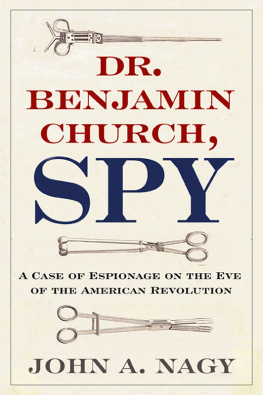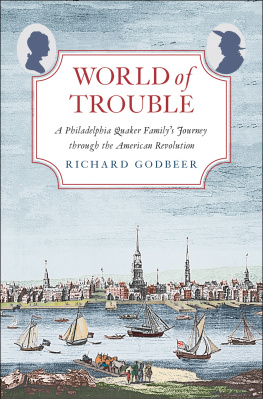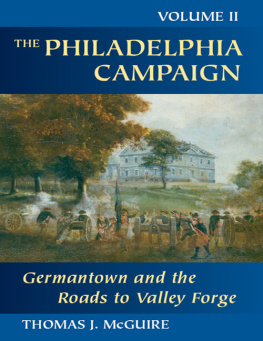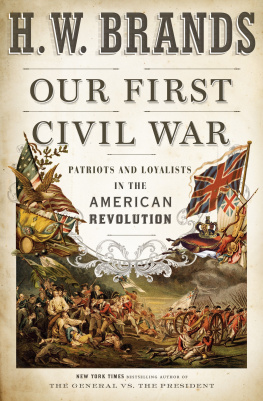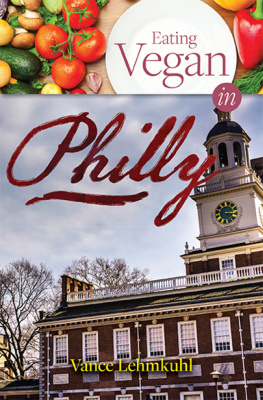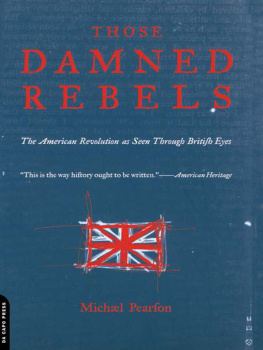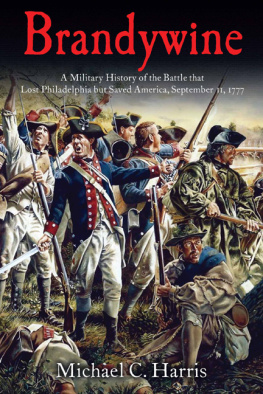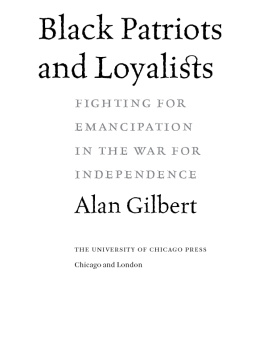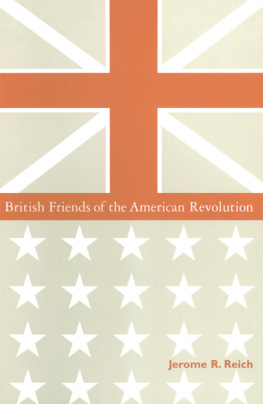The Disaffected
EARLY AMERICAN STUDIES
Series editors:
Daniel K. Richter, Kathleen M. Brown,
Max Cavitch, and David Waldstreicher
Exploring neglected aspects of our colonial,
revolutionary, and early national history and culture,
Early American Studies reinterprets familiar themes
and events in fresh ways. Interdisciplinary in character,
and with a special emphasis on the period from about
1600 to 1850, the series is published in partnership with
the McNeil Center for Early American Studies.
A complete list of books in the series
is available from the publisher.
The
DISAFFECTED

Britains Occupation of Philadelphia During the American Revolution
Aaron Sullivan

Publication of this volume was aided by the
C. Dallett Hemphill Publication Fund.
Copyright 2019 University of Pennsylvania Press
All rights reserved. Except for brief quotations used for purposes of review or scholarly citation, none of this book may be reproduced in any form by any means without written permission from the publisher.
Published by
University of Pennsylvania Press
Philadelphia, Pennsylvania 19104-4112
www.upenn.edu/pennpress
Printed in the United States of America on acid-free paper
1 3 5 7 9 10 8 6 4 2
Library of Congress Cataloging-in-Publication Data
Names: Sullivan, Aaron, author.
Title: The disaffected: Britains occupation of Philadelphia during the American Revolution / Aaron Sullivan.
Other titles: Early American studies.
Description: 1st edition. | Philadelphia: University of Pennsylvania Press, [2019] | Series: Early American studies | Includes bibliographical references and index.
Identifiers: LCCN 2018045832 | ISBN 9780812251265 (hardcover)
Subjects: LCSH: Philadelphia (Pa.)HistoryRevolution, 17751783. | Philadelphia (Pa.)HistoryRevolution, 17751783Conscientious objectors. | Philadelphia Campaign, 17771778. | United StatesHistoryRevolution, 17751783Social aspects. | United StatesPolitics and government17751783.
Classification: LCC E263.P4 S85 2019 | DDC 974.8/1103dc23
LC record available at https://lccn.loc.gov/2018045832
CONTENTS


No one can simultaneously serve two masters who are opposed to each other. Anyone who adheres to one party will be hated and persecuted by the other. Anyone who tries to remain neutral and keep on terms with neither or both parties will be oppressed and harassed by both sides when the controversy is pushed so far that proposals of peace are rejected and the matter is to be decided by resort to arms.
Henry Melchoir Muhlenberg, November 24, 1777
Elizabeth and Henry Drinker of Philadelphia were no friends of the American Revolution. Yet neither were they its enemies. They neither took up arms against the Revolutionaries nor raised regiments of Loyalists; they were not outspoken champions of King George III or Parliament, nor did they conspire to overthrow the independent governments of Pennsylvania and the United States. A merchant family, the Drinkers were Quakers and pacifists; they shunned commitments to either side in the struggle and strove to pass through the storm of war uninvolved and unscathed. They failed. In 1777 the war came to Philadelphia when the city was taken and occupied by the British army. Elizabeth faced that army, in the streets and in her own home, alone, because before the British came for Philadelphia, the American Revolution came for Henry Drinker.
They arrived on September 2, while it was still morning, and moved systematically through the city and suburbs of Philadelphia. Agents of Pennsylvanias new Supreme Executive Council, they carried with them a long list containing the names of prominent men who, very soon, would be surprised to learn that they had been declared enemies of the state. Those on the list were to be arrested or detained, their papers and effects searched and seized. In a reversal of standard practice, it was hoped that the searches would provide evidence to retroactively justify the arrests. Surprise was essential; the councils agents, some two dozen men led by David Rittenhouse and Colonel William Bradford, divided themselves into smaller groups to reach their targets more speedily and directed their first moves with care. An early priority was John Hunt, a Quaker merchant who lived in Germantown, some five miles from the city, and so might successfully escape if word of the arrests reached him before the councils deputies. Leaders and record keepers, those like John Pemberton and Samuel Emlen, were also among the first to be confronted, lest they attempt to hide or destroy the evidence which, it was hoped, would vindicate the days actions.
Some of the targets went peacefully, submitting quietly to the alleged authority of the Supreme Executive Council and those sent to carry out its orders. Others took this moment to pledge their allegiance to the Revolutionary governments and swore to keep themselves under house arrest until summoned or released by order of the council. If they were also, in the eyes of the council, men of reputation and promised to never again speak or write anything inimical to the new regime, they were allowed to remain free, though their property was still subject to search and their papers liable to be seized. Few on the list, however, felt such complete loyalty (or humility) toward the newly created, highly contested, and as yet untried independent governments of the United States. The councils men soon met resistance, though not the kind one often associates with Revolutionary wars; after all, most of the men on the list were pacifists.
Three of the councils deputies came to arrest John Pemberton and search his papers. Pemberton, a Quaker merchant in his fifties, explained that he had never done anything harmful to his country and that, indeed, his well-known religious beliefs forbade any violent or treasonous acts. Appealing to their sense of justice, he pointed out that he had been accused of no crime, that no judge had issued a warrant for his arrest, and that the council had sent them to carry out an act of oppression. The deputies squirmed and confessed that it was very disagreeable to them to execute such orders but that the decision was not theirs to make, prompting Pembertons wife to remind them that Pilate had similarly attempted to excuse his involvement in Christs crucifixion. When the councils men attempted to take Pemberton by force, he wrapped his old hands around his sturdy wooden chair and refused to be moved. In the end, a band of soldiers were called in to bodily lift the elderly Quaker, carry him out the door, and escort him to confinement in the Masonic lodge. The deputies later returned to search the house and, since Pemberton would not voluntarily surrender the keys, smashed their way into his locked desk. They came away with minutes from Quaker meetings, several documents regarding the manumission of slaves, and no evidence whatsoever that Pemberton was a threat to the country.
Pemberton was not alone in protesting the legality of the councils actions. More than one target on the list demanded to see a formal warrant for their arrest and scoffed at the suggestion that orders from the Supreme Executive Council were a sufficient substitute. Some, like Thomas Fisher, nonetheless eventually yielded to their demands, preferring to go quietly rather than have their homes invaded by soldiers. Others, like John Hunt, flatly refused to obey what they considered illegal orders. Like Pemberton, Hunt would not be moved unless physically forced out. The councils agents had no choice but to return the following day with more manpower; contrary to their concerns, Hunt made no attempt to flee.
Next page

